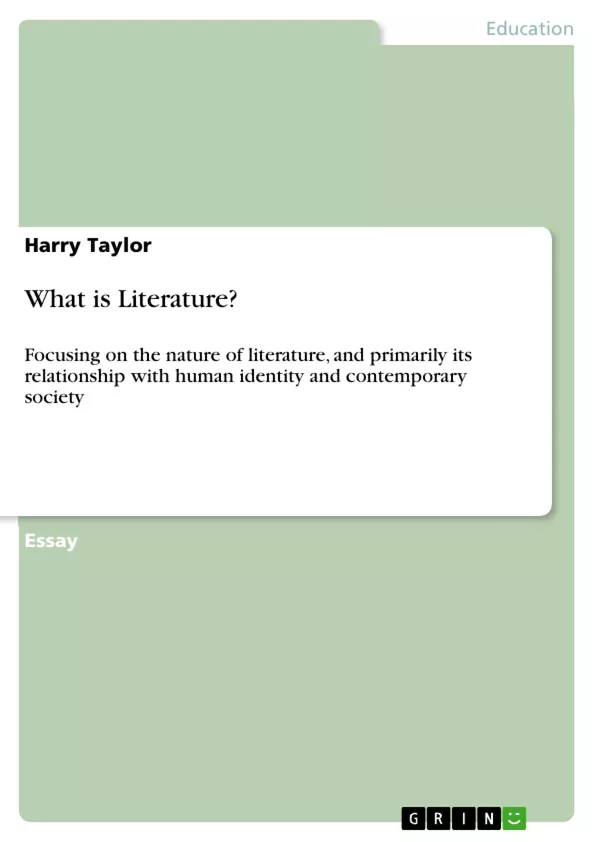This essay focuses on the nature of literature, and primarily its relationship with human identity and contemporary society. The focal element of the inquiry will be the consideration of literature functioning as a cynosural social conscience, and the extent to which it defines, affects and reflects collaborative social identity whilst remaining a non-cognisant ‘entity’ in its own right.
Table of Contents
- What is Literature?
- The Author and the Reader
- Society as the Source of Literature
- The Author as Channel for the Zeitgeist
- The Role of Society in Defining Literature
- Literature as a Reflection of Society
- The Author as Mirror to Society
- Literature as an Addition to Reality
- Literature as a Force for Social Change
- The Author as Catalyst for Change
- The Role of the Reader in Shaping the Zeitgeist
- The Death of the Author
- The Author as Palette
- Literature as a Machine for Generating Interpretations
- The Author's Identity in Literature
- The Reader as Interpreter
Objectives and Key Themes
This essay explores the nature of literature and its relationship with human identity and contemporary society. It focuses on the role of literature as a social conscience and its ability to define, affect, and reflect social identity. The essay examines the intricate relationship between the author, reader, and society in shaping the meaning and impact of literary works. The key themes explored in the essay are: * **The Author's Role in Reflecting Society:** How authors are influenced by their social contexts and use literature as a tool to engage with societal issues. * **The Impact of Society on Literature:** The ways in which societal norms, values, and events shape the creation and reception of literary works. * **The Reader's Interpretation:** How readers engage with literary texts and contribute to their meaning and impact. * **The Author's Identity and the Death of the Author:** The debate over the author's role in shaping a text and whether their individual identity should be considered separate from the work. * **Literature as a Force for Social Change:** How literature can challenge societal norms, provoke critical thinking, and influence social movements.Chapter Summaries
The essay begins by exploring the concept of literature as a social conscience, arguing that literature functions as a reflection, critique, and potentially even a force for change within society. The author examines the intricate relationship between the author, reader, and society, highlighting the role of society in shaping the author's perspective and the reader's interpretation. The essay then delves into the concept of the "death of the author," a theoretical concept that posits that the author's identity should be disregarded when interpreting a text, as it is the language itself that speaks. The author analyzes the implications of this theory, arguing that while the author's identity may be irrelevant, their role as a channel for societal reflection remains important. The essay concludes by focusing on the reader's role in interpreting literature, emphasizing that the reader's unique perspective plays a crucial role in shaping the meaning and impact of a literary work.Keywords
This essay explores the complex relationship between literature, society, and individual identity. It examines key concepts like social conscience, zeitgeist, authorial intent, reader response, and the "death of the author" theory. The essay also focuses on the role of literature as a force for social change and its ability to reflect and challenge contemporary societal norms and values.Frequently Asked Questions
What is the central inquiry of the essay "What is Literature?"?
The essay explores the nature of literature and its complex relationship with human identity and contemporary society.
What does "Literature as a social conscience" mean?
It refers to the role of literature in reflecting, critiquing, and potentially influencing the moral and social values of a society.
What is the "Death of the Author" theory?
It is a theoretical concept suggesting that a text should be interpreted independently of the author's personal identity and intent.
How does literature act as a force for social change?
Literature can challenge established norms, provoke critical thinking in readers, and act as a catalyst for societal shifts.
What role does the reader play in defining literature?
The essay emphasizes that the reader's unique perspective and interpretation are crucial in generating the ultimate meaning of a literary work.
- Quote paper
- Harry Taylor (Author), 2010, What is Literature?, Munich, GRIN Verlag, https://www.hausarbeiten.de/document/207922


